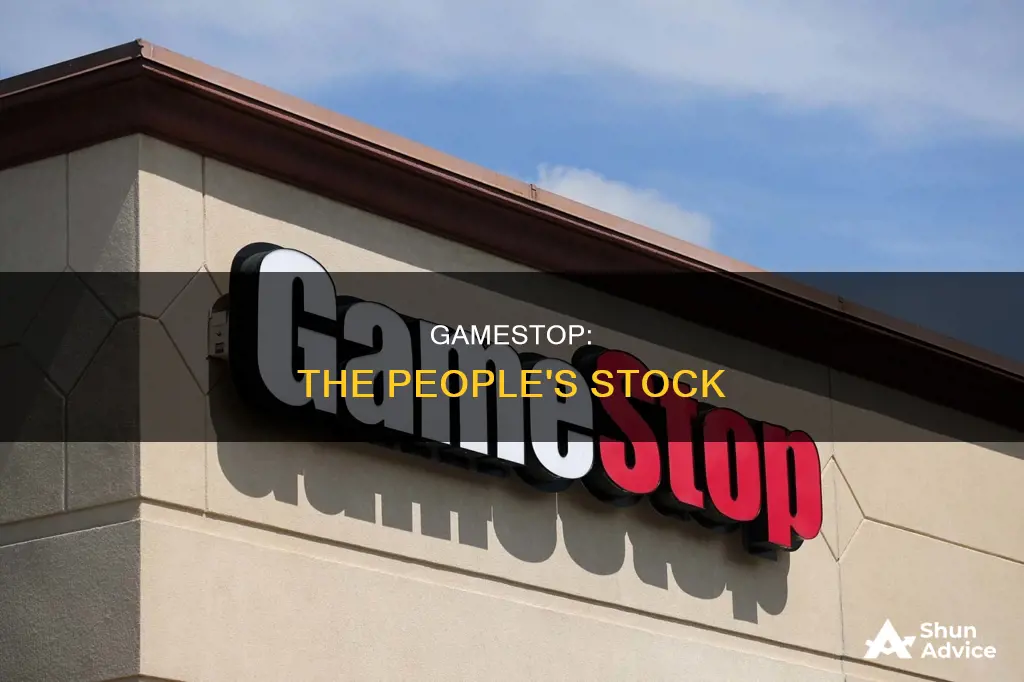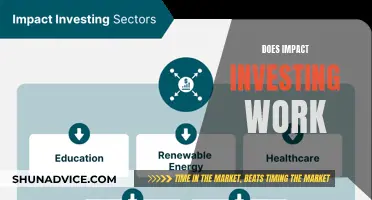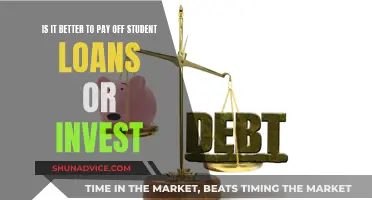
GameStop's stock surge has been attributed to a short squeeze orchestrated by a group of traders on the Reddit group r/WallStreetBets. The group's efforts drove up the share price of the struggling video game retailer, which had been heavily shorted by hedge funds and other Wall Street investors. The short squeeze was caused by a rush of traders buying GameStop stock, which forced short-sellers to buy back the stock at a higher price to cover their losses. This created a cycle that drove up the share price even further. The situation has been characterised as a battle between amateur and professional investors, with some celebrating the losses incurred by hedge funds. However, some have warned that the surge is unsustainable and that the bubble will eventually burst.
| Characteristics | Values |
|---|---|
| Date | 27 January 2021 |
| Price of a single stock | $145 |
| Price of a single stock a year ago | $15, with a low of $3 |
| Reason for investment | Savvy short-term investing |
| Investor type | Hobby investors, not full-time traders |
| Investor motivation | FOMO, irreverent view of the stock market, childhood memories |
| Investor risk appetite | High |
| Investor outlook | Positive, expecting a short-term gain |
| Investor concerns | Media coverage, inexperienced investors jumping into stocks without research |
| Investor action | Eventually sell and make a profit |
What You'll Learn

A short squeeze caused by a large number of shares being sold short
A short squeeze occurs when a stock's price rises sharply, causing traders who had sold the stock short to close their positions. In the case of GameStop, a large number of shares were sold short, meaning many investors were betting on its price falling. However, the price of GameStop shares rose instead, resulting in a short squeeze.
Short selling involves borrowing shares of a stock that an investor believes will decline in value and selling them on the open market. The investor then hopes to buy back the shares at a lower price and pocket the difference. In the case of GameStop, short sellers expected the company to struggle due to its brick-and-mortar stores in an age of digital retailers and online gaming. However, the involvement of Chewy co-founder Ryan Cohen, who joined GameStop's board and brought digital experience to the company, led many investors to believe in a potential turnaround.
As the price of GameStop shares began to rise, short sellers were forced to buy back the shares to limit their losses. This created a rush to buy GameStop stock, which further drove up prices. The higher price caused more short sellers to buy back stock, creating a vicious cycle and accelerating the stock's price rise. This dynamic is known as a short squeeze, and it can lead to significant losses for short sellers.
The GameStop short squeeze was also fuelled by a group of traders on the Reddit group WallStreetBets, who coordinated to drive up the share price. This group of mostly young day traders saw an underdog and a piece of their gaming childhood in GameStop, rather than a struggling retailer. The activity on GameStop stock by this group thrust them into the spotlight, with the media portraying them as a rogue troll army messing with the official practices of Wall Street.
Trump Investors: Winners or Losers?
You may want to see also

A belief that the company was undervalued
GameStop's stock surge can be attributed to a belief that the company was undervalued. This perspective is informed by the following factors:
- The involvement of Chewy co-founder Ryan Cohen, who brought digital expertise to the company. This signalled a potential turnaround for GameStop, which had been struggling to adapt to the digital age and compete with online retailers. Cohen's initial 9% stake in the company, followed by an increase to nearly 13%, and his addition of three people to GameStop's board of directors, fuelled optimism among investors.
- The impact of the COVID-19 pandemic, which kept people at home and increased demand for video games. This shift in consumer behaviour may have contributed to a perception that GameStop was undervalued, especially as video games became staples during the pandemic.
- The company's efforts to remodel stores into experiential event spaces. This suggested that GameStop was attempting to adapt to the changing retail landscape and enhance the in-store experience for customers.
- Brand recognition and nostalgia played a role as well. GameStop is a well-known brand with a presence in the public gaming consciousness. For some investors, the company represented an underdog and evoked childhood memories, influencing their decision to invest.
- The short squeeze dynamic, where short-sellers were forced to buy back stock as prices rose, further contributed to the surge in GameStop's stock price.
While there were legitimate reasons to believe that GameStop was undervalued, it's important to note that the stock surge may not have been solely driven by the company's fundamentals. The involvement of the Reddit group WallStreetBets, which targeted short-sellers and created a short squeeze, played a significant role in driving up the stock price.
Fidelity's Investor Numbers
You may want to see also

The involvement of Chewy co-founder Ryan Cohen
Ryan Cohen, the co-founder of Chewy, is a Canadian entrepreneur and activist investor. Cohen's involvement with GameStop began in August 2020 when his investment firm, RC Ventures, purchased a 9% stake in the company, making him the largest individual shareholder. Cohen's initial investment of around $76 million was for 9 million shares bought at an average price of $8.43. This stake was later increased to 12.9% in December 2020.
Cohen's entry into GameStop triggered a stock rally, with the share price increasing by 1,500% within two weeks, resulting from a short squeeze. This was not the first time Cohen had made a significant profit—he founded Chewy in 2011 and sold it in 2017 for $3.35 billion, the largest e-commerce acquisition of all time.
In January 2021, Cohen joined the GameStop board, bringing two Chewy executives with him. He was also appointed chairman and tasked with leading a company-wide transformation. Since then, Cohen has been instrumental in several changes at GameStop, including the departure of multiple executives and board members, and the hiring of several Amazon and Chewy executives.
In September 2023, Cohen became the CEO of GameStop, a role he takes no salary for. As CEO, Cohen has been given the authority to manage the company's securities portfolio and make investments in other stocks on the company's behalf. This has been a controversial decision, with some analysts arguing that GameStop should use any extra cash to buy back its own stock. Despite this, Cohen's strong record as an activist investor could be beneficial for the company's portfolio.
In addition to his investments in GameStop, Cohen has also made significant investments in other companies, including Apple, Wells Fargo, and Bed Bath & Beyond.
Wealth in the 16th Century: Investing in Land and Trade
You may want to see also

Reddit group WallStreetBets targeting short-sellers
The popular Reddit group r/WallStreetBets has been targeting short-sellers, who are investors betting that a stock is going to fall. The group has a particular distaste for short-sellers, who are often viewed as "bloodsuckers" and are blamed for creating a house-of-cards financial system that led to the 2008 crisis.
Redditors on r/WallStreetBets saw the short opportunity early and moved in to buy GameStop stock early and cheap, creating a short squeeze. Short sellers rushing to buy while minimising losses created a rush to buy GameStop stock, which in turn drove up prices.
In a post titled "Bankrupting Institutional Investors for Dummies, ft Gamestop", a Reddit user outlined the short interest in GameStop and why buying the stock may not be a bad idea. The post received 688 upvotes and 346 comments.
The group's efforts have paid off, with Melvin Capital Management, a short-seller hedge fund, requiring a $3 billion external investment to stabilise its fund after a variety of short bets fell through, including its bet against GameStop.
The group's actions have sparked debate about market manipulation and calls for regulatory oversight. Nasdaq CEO Adena Friedman and US Senator Elizabeth Warren have called on US regulators to examine the situation. However, Representative Alexandria Ocasio-Cortez expressed little sympathy for the squeezed short-sellers, tweeting that they "have a long history of treating our economy like a casino".
Investing: Separating Fact from Fiction
You may want to see also

The rise of no-fee trading apps
These apps have disrupted the way people trade stocks, providing free access to stock, options, and ETF trades, as well as low or no account fees. Some apps, like Robinhood, even offer cryptocurrency trading. This has made investing more accessible to a wider range of people, who can now invest small amounts of money without being burdened by transaction costs.
The most popular no-fee trading apps include Robinhood, Charles Schwab, Fidelity, SoFi Active Investing, and Webull. These apps have user-friendly interfaces and offer a variety of features such as fractional share investing, retirement accounts, and in-app research and analysis tools.
While these apps have made investing more accessible, it's important for users to remember that investing still carries risks. Volatile investments can lead to losses, so it's crucial not to invest money that you can't afford to lose. Additionally, while these apps offer a range of features, they may not be suitable for all investors, especially those with more complex needs or those seeking more advanced trading tools.
Starbucks: Worth Your Investment?
You may want to see also
Frequently asked questions
A group of mostly young day traders coordinated on Reddit to drive up the share price of struggling companies, including GameStop.
The subreddit is called WallStreetBets.
The strategy is called short-selling. Investors borrow stock and sell it in the hopes that prices for the stock will continue to drop. If that happens, they can buy back the stock for cheaper and keep the difference as profit.
In addition to GameStop, companies like BlackBerry, Macy's, and AMC have also seen their stock prices driven up by WallStreetBets.
Critics argue that the GameStop stock surge is not indicative of the company's actual current performance, which is still struggling.







